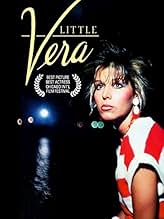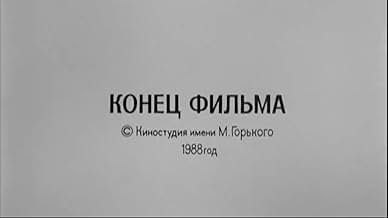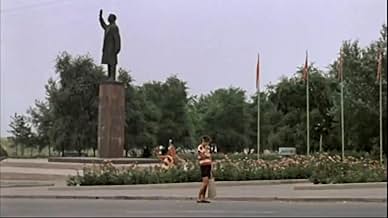IMDb-BEWERTUNG
6,9/10
2283
IHRE BEWERTUNG
Füge eine Handlung in deiner Sprache hinzuA teenage girl, who has just finished school feels trapped and aimless in her ordinary Russian family, supported by an alcoholic father, in a dull industrial town.A teenage girl, who has just finished school feels trapped and aimless in her ordinary Russian family, supported by an alcoholic father, in a dull industrial town.A teenage girl, who has just finished school feels trapped and aimless in her ordinary Russian family, supported by an alcoholic father, in a dull industrial town.
- Regie
- Drehbuch
- Hauptbesetzung
- Auszeichnungen
- 7 Gewinne & 9 Nominierungen insgesamt
Aleksandr Negreba
- Viktor - brat Very
- (as Alexander Alexseyev Negreba)
Aleksandra Tabakova
- Lenka Chistyakova
- (as Alexandra Tabakova)
Gennady Goryachev
- Sledovatel
- (as G. Goryachev)
Vadim Zakharchenko
- Muzhchina v bolnichnoy palate
- (as V. Zakharchenko)
Mariya Khmelik
- podruga Viktora
- (as M. Khmelik)
Maksim Nayrabe
- brat Lenki Chistyakovoy
- (as Maxim Nairabe)
Empfohlene Bewertungen
10fred3f
It is difficult, today and in the US, to understand this movie. We have nothing, really, to compare it with. Here is an attempt at comparison: It is as if during the last years of Saddam's rule, a filmmaker in Iraq were somehow able to make a film, which, for the first time ever, showed life as it really was lived in that country. The life of ordinary young girl, with all the terror and the repression full blown. Then the film was exhibited freely in Iraq. If you could imagine that unlikely event, then you might have an idea of what went on with this film in the last few years of the Soviet Union. Prior to this film, Soviet cinema was highly censored. Soviet movies would only show an ideal life in the worker's paradise. Then suddenly this. The alcoholism, the random sex, the ugly wasteland that was the Soviet city, the choking pollution, the proletariat victimizing each other and themselves, the utter hopelessness - it is all there. People were stunned. Soviet women would often weep during the showings. Many would say that this is the story of their lives. It was a cultural earthquake the like of which filmmakers only dream of accomplishing. It undoubtedly hastened the breakup of the Soviet Union.
Reading the reviews here, I can see that few understand this film. One says it was groundbreaking because it contained real sex. To the Soviet viewers at the time, the sex was a minor event compared to fact that it portrayed reality for the first time in Soviet cinema.
Others compare it to current films such as "As Good as it Gets" Might as well compare Homer's Illiad to the latest John Grissam novel. They simply do not compare. This is not just a film, this is was a social document, and a transforming social force. It needs to be viewed that way or you will not understand the film.
Other reviewers see it as a film about a dysfunctional Russian family. One even says that it is difficult to feel sorry for Vera because she keeps coming back to her family. The point is that Vera and her family are symbols for all of Soviet life. There was nowhere else to go, because the family down the block and in the next town were the same. This was life in the Soviet Union for most people.
This is a film that can be viewed on many levels: as a drama it traces the landscape of despair, as a social document it shows the living conditions of the time, as a political document it shows the attitude of the people and many of the reasons for the break-up of the Soviet Union, and as a moral document it shows the evils of a dictatorship that is out of control, and the cruelties that victims will practice on each other.
Little Vera clearly shows the human toll that Socialism eventually takes on its victims, despite any good intentions that system may have. In doing so it helped end the Soviet regime thus contributing to one of the major changes in modern history. This film achieves what only a few films have ever accomplished. It is not only an stunning representation of history but it also become a force in that shaped history.
Reading the reviews here, I can see that few understand this film. One says it was groundbreaking because it contained real sex. To the Soviet viewers at the time, the sex was a minor event compared to fact that it portrayed reality for the first time in Soviet cinema.
Others compare it to current films such as "As Good as it Gets" Might as well compare Homer's Illiad to the latest John Grissam novel. They simply do not compare. This is not just a film, this is was a social document, and a transforming social force. It needs to be viewed that way or you will not understand the film.
Other reviewers see it as a film about a dysfunctional Russian family. One even says that it is difficult to feel sorry for Vera because she keeps coming back to her family. The point is that Vera and her family are symbols for all of Soviet life. There was nowhere else to go, because the family down the block and in the next town were the same. This was life in the Soviet Union for most people.
This is a film that can be viewed on many levels: as a drama it traces the landscape of despair, as a social document it shows the living conditions of the time, as a political document it shows the attitude of the people and many of the reasons for the break-up of the Soviet Union, and as a moral document it shows the evils of a dictatorship that is out of control, and the cruelties that victims will practice on each other.
Little Vera clearly shows the human toll that Socialism eventually takes on its victims, despite any good intentions that system may have. In doing so it helped end the Soviet regime thus contributing to one of the major changes in modern history. This film achieves what only a few films have ever accomplished. It is not only an stunning representation of history but it also become a force in that shaped history.
In Russia, the ordinary teenager Vera (Natalya Negoda) lives a leisured life with her drunkard father and her simpleton mother, without working and waiting for the calling for a technical course of telephone operator. Her brother Victor (Aleksandr Negreba) lives in Moscow with the family of his own and occasionally visits his dysfunctional family and Vera, being always motive for arguing. When Vera meets the student of university Sergei (Andrei Sokolov), they fall in love for each other and decide to get married. Sergei moves to Vera's house, but lives in conflict with her father. This relationship leads the family to a tragedy.
I have just seen "Malenkaya Vera", and I liked a lot this deep family drama. I am not familiarized with the life style in the former URSS, but there are some unusual behaviors that I found very interesting. The first one, when Victor tells Vera that she was conceived not because her parents wanted to have her, but because they wanted to move to a larger apartment. Another one, when the family goes to the beach in a truck. Many difficulties of Vera's family and their friends, the repression in the park and other situations pictured in the movie are common in Third World countries. This low budget movie is very well-directed, and the story is very profound and real. The cast has great performances and the actress Natalya Negoda is very beautiful. In the cover of the Brazilian VHS, released by Sagres distributor, there is information that Natalya Negoda was the centerfold of Playboy magazine. I am not sure how precise are the subtitles in Portuguese, since many long sentences spoken in Russian are limited to short translation in few words. My vote is seven.
Title (Brazil): "A Pequena Vera" ("The Little Vera")
I have just seen "Malenkaya Vera", and I liked a lot this deep family drama. I am not familiarized with the life style in the former URSS, but there are some unusual behaviors that I found very interesting. The first one, when Victor tells Vera that she was conceived not because her parents wanted to have her, but because they wanted to move to a larger apartment. Another one, when the family goes to the beach in a truck. Many difficulties of Vera's family and their friends, the repression in the park and other situations pictured in the movie are common in Third World countries. This low budget movie is very well-directed, and the story is very profound and real. The cast has great performances and the actress Natalya Negoda is very beautiful. In the cover of the Brazilian VHS, released by Sagres distributor, there is information that Natalya Negoda was the centerfold of Playboy magazine. I am not sure how precise are the subtitles in Portuguese, since many long sentences spoken in Russian are limited to short translation in few words. My vote is seven.
Title (Brazil): "A Pequena Vera" ("The Little Vera")
Vera is a rebellious daughter of dissatisfied proletariat parents. Her father Kolya is an alcoholic. They keep referring to her older brother Victor who is a success in Moscow. They don't like her lifestyle or her friends. She falls for Sergei and decides to marry. It raises the tension in the family. Sergei and and Kolya don't get along. Sergei starts living with the family but it doesn't go well in one violent drunken confrontation.
The film looks pretty grainy and weak compared to most indies of that time. It was sold as the first sex scene in Soviet cinema but there is nothing erotic about this movie. It is gritty, and dirty. The overbearing poverty is the backdrop. That is the more compelling aspect. The story of a rebellious daughter and family dysfunction is not necessarily original. It is somewhat new to see it portrayed about Russia at that time. The movie is filled with a downtrodden sadness and that goes for the lead actress Natalya Negoda. It's fine as a grungy indie and notable for being a Soviet film.
The film looks pretty grainy and weak compared to most indies of that time. It was sold as the first sex scene in Soviet cinema but there is nothing erotic about this movie. It is gritty, and dirty. The overbearing poverty is the backdrop. That is the more compelling aspect. The story of a rebellious daughter and family dysfunction is not necessarily original. It is somewhat new to see it portrayed about Russia at that time. The movie is filled with a downtrodden sadness and that goes for the lead actress Natalya Negoda. It's fine as a grungy indie and notable for being a Soviet film.
Please Note: This review mentions key moments in this film. Do not read if you have not seen the movie!
Vera, the protagonist in the film Little Vera, lives in a closed, cramped world. She is trying to escape, both emotionally and physically, but in the end is no closer to freedom. Most of the reviews I read brought up the recurrent theme of limited space in this movie. The family apartment represents Vera's closed world in the simplest sense. She has no room to move, no room to grow and no room to find herself. Everywhere she turns the finds herself face to face with her mother, father, brother or simply a wall.
However, the family apartment is only one way that the director maintains this constant feeling of confinement. Throughout the film, Vera is rarely shown at a distance. She is always in a small room, or sitting directly next to someone else, or being physically smothered by those around her (Andrei, Sergei, etc.). She is almost always in physical contact with another person. During the rare times that she truly is alone, such as when she is attempting suicide, the camera only zooms in closer. In this way, the lens replaces the walls and smothering humanity, itself becoming an object of confinement.
If visual effects of confinement aren't possible, then sound is used to heighten the sense of disparity. Most of the dialogue in Little Vera, with the exception of less intense moments when the music volume is increased, is shouted, yelled or screamed. Vera's family is constantly in conflict and even the most civil dinner eventually erupts into argument. I found the constant barrage of sound equally as suffocating as the repeated scenes within the tiny apartment, and twice as hard on the nerves. Unlike Vera, however, we could leave when it was all over.
It is hard not to feel sorry for Vera at the end of the movie, but is our sympathy justified? She returns, time and again, to the very apartment and situation that is slowly taking the life out of her. Can she really be considered a victim if she is bringing a lot of her misery upon herself?
Vera, the protagonist in the film Little Vera, lives in a closed, cramped world. She is trying to escape, both emotionally and physically, but in the end is no closer to freedom. Most of the reviews I read brought up the recurrent theme of limited space in this movie. The family apartment represents Vera's closed world in the simplest sense. She has no room to move, no room to grow and no room to find herself. Everywhere she turns the finds herself face to face with her mother, father, brother or simply a wall.
However, the family apartment is only one way that the director maintains this constant feeling of confinement. Throughout the film, Vera is rarely shown at a distance. She is always in a small room, or sitting directly next to someone else, or being physically smothered by those around her (Andrei, Sergei, etc.). She is almost always in physical contact with another person. During the rare times that she truly is alone, such as when she is attempting suicide, the camera only zooms in closer. In this way, the lens replaces the walls and smothering humanity, itself becoming an object of confinement.
If visual effects of confinement aren't possible, then sound is used to heighten the sense of disparity. Most of the dialogue in Little Vera, with the exception of less intense moments when the music volume is increased, is shouted, yelled or screamed. Vera's family is constantly in conflict and even the most civil dinner eventually erupts into argument. I found the constant barrage of sound equally as suffocating as the repeated scenes within the tiny apartment, and twice as hard on the nerves. Unlike Vera, however, we could leave when it was all over.
It is hard not to feel sorry for Vera at the end of the movie, but is our sympathy justified? She returns, time and again, to the very apartment and situation that is slowly taking the life out of her. Can she really be considered a victim if she is bringing a lot of her misery upon herself?
Little Vera is the story of a Russian teenager, her family, and her attempts to find meaning and value in a life sliding increasingly into decay. In her search for meaning, she falls in love with a more intellectual and rebellious Sergei, whose hatred for her deeply flawed parents quickly spirals out of control.
Little Vera is shocking and disturbing in nearly every way. The drinking of the father, the enabling and lack of understanding of the mother, the casual lies and misdirection of the brother, and Vera herself forgiving them all their flaws are all shocking and slightly disturbing to watch. However, the raw honesty of the film somehow manages to become even more shocking than the plot or characters. Set in cramped spaces and vast urban decay, Little Vera presented a vastly different view of Soviet life than had ever been seen before. In fact, Little Vera is a portrait of the collapse of Soviet society painted in shades of pain, desperation, and rust. It is the implosion of a family set against the implosion of an entire social order.
Although painful and desperately unsatisfying, the film itself is definitely worth seeing, if only to understand the feelings and cultures still reshaping Russia today.
Little Vera is shocking and disturbing in nearly every way. The drinking of the father, the enabling and lack of understanding of the mother, the casual lies and misdirection of the brother, and Vera herself forgiving them all their flaws are all shocking and slightly disturbing to watch. However, the raw honesty of the film somehow manages to become even more shocking than the plot or characters. Set in cramped spaces and vast urban decay, Little Vera presented a vastly different view of Soviet life than had ever been seen before. In fact, Little Vera is a portrait of the collapse of Soviet society painted in shades of pain, desperation, and rust. It is the implosion of a family set against the implosion of an entire social order.
Although painful and desperately unsatisfying, the film itself is definitely worth seeing, if only to understand the feelings and cultures still reshaping Russia today.
Wusstest du schon
- WissenswertesThis was the first Soviet film to depict graphic sexual intercourse on screen.
- SoundtracksHeaven And Hell
(uncredited)
Written by Dieter Bohlen
Performed by C.C. Catch
Produced by Dieter Bohlen
[plays during playback of the video clip of the same name C. C. Catch]
Top-Auswahl
Melde dich zum Bewerten an und greife auf die Watchlist für personalisierte Empfehlungen zu.
- How long is Little Vera?Powered by Alexa
Details
Box Office
- Bruttoertrag in den USA und Kanada
- 1.262.598 $
- Eröffnungswochenende in den USA und in Kanada
- 23.950 $
- 16. Apr. 1989
- Weltweiter Bruttoertrag
- 1.262.598 $
Zu dieser Seite beitragen
Bearbeitung vorschlagen oder fehlenden Inhalt hinzufügen































